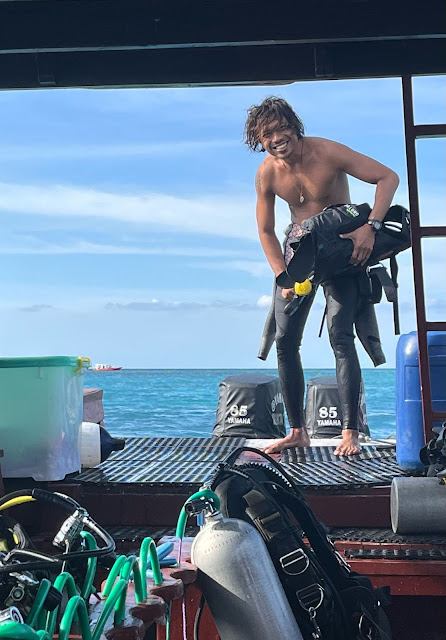The Advantages of PADI Open Water Certification Over the Discover Scuba Diving Program
Introduction
Diving into the world of scuba diving can be an exhilarating experience, and choosing the right program is crucial. At Oceans 5 Gili Air, we offer several entry-level PADI scuba diving programs, including the popular PADI Discover Scuba Diving Program and the comprehensive PADI Open Water Course. While the Discover Scuba Diving program is a fantastic introduction, obtaining a PADI Open Water certification offers a wealth of long-term benefits. Let's dive into why opting for the Open Water certification could be the best decision for your diving adventures.
 |
| PADI Open Water Course at Oceans 5 Gili Air |
Discover Scuba Diving: A Brief Introduction
The PADI Discover Scuba Diving Program at Oceans 5 is a one-day experience designed for beginners. This program starts with a theory lesson, utilizing resources like a flip chart or the Digital PADI Discover Scuba Diving manual. The key aspect is the pool session, where instructors guide students through basic scuba skills, preparing them for an ocean dive to a maximum depth of 12 meters. This program is marked by its focus on quality teaching and not rushing through the skills, ensuring students feel confident and comfortable. The ocean dive is a pure sightseeing experience under the supervision of an experienced instructor, culminating in a certificate of completion and a feature on our Instagram page.
PADI Open Water Course: A Comprehensive Dive into Scuba
In contrast, the PADI Open Water Course is a 3-4 day program that certifies you as a confident scuba diver. The days are structured, running from 8:30 am to 5:30 pm, including lunch and coffee breaks. This course goes beyond the basics, covering extensive theory and practical skills. It allows you to dive independently with a buddy up to a depth of 18 meters. Here's why the PADI Open Water certification is a valuable investment:
Depth of Learning: The Open Water Course provides a comprehensive understanding of scuba diving, covering important aspects such as equipment, safety protocols, and environmental awareness. This depth of knowledge is crucial for safe and enjoyable diving experiences.
Independence: Once certified, you have the freedom to dive independently with a buddy. This opens up a world of diving opportunities, allowing you to explore dive sites without the need for a guided tour.
Skill Mastery: The extended duration of the Open Water Course ensures you master the necessary skills to handle various diving situations confidently. This proficiency is essential for both your safety and enjoyment underwater.
Global Recognition: The PADI Open Water certification is recognized worldwide, meaning you can dive at countless locations across the globe. This certification is your passport to explore the underwater world.
Cost-Effectiveness: While the initial investment in the Open Water Course is higher than the Discover Scuba Diving program, it is more cost-effective in the long run. With a certification, you don't need to repeat introductory courses at each new location, saving time and money.
Personal Development: The course is not just about diving; it's about personal growth. You'll develop skills like problem-solving, communication, and adaptability, which are valuable in and out of the water.
Community and Networking: Becoming a certified diver connects you to a global community of divers. This network can be a fantastic resource for travel recommendations, gear advice, and friendship.
Conclusion
While the PADI Discover Scuba Diving program at Oceans 5 Gili Air is an excellent introduction to the underwater world, the PADI Open Water Course offers a more thorough and rewarding path into scuba diving. It's an investment in your skills, safety, and future diving adventures. With this certification, the ocean's depths become a playground of endless exploration, waiting to be discovered by you. If you're serious about diving and want to make the most of your underwater experiences, the PADI Open Water Course is the way to go.


Comments
Post a Comment